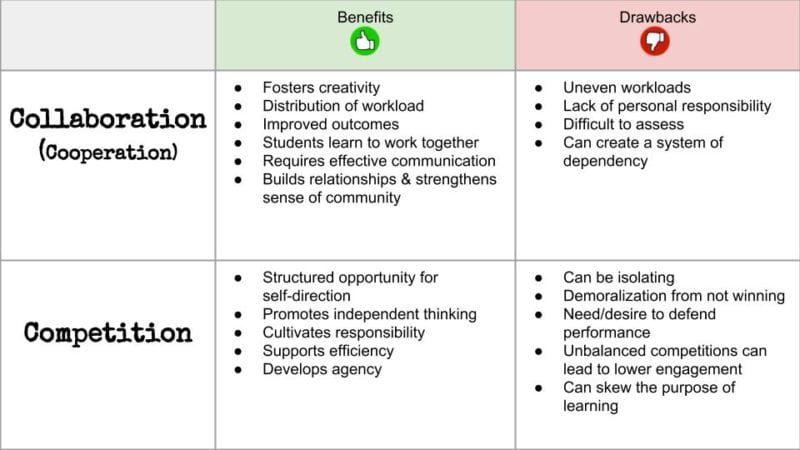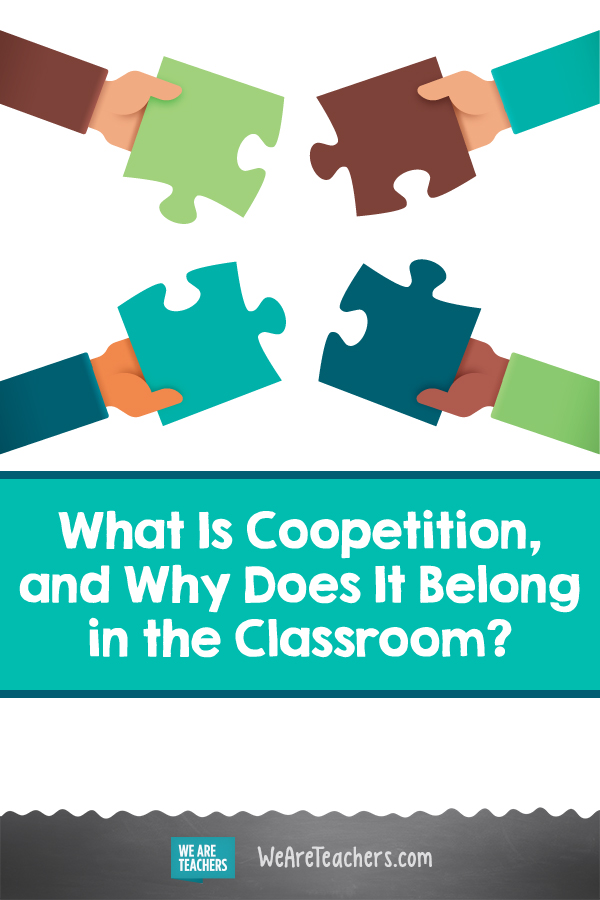In my mind, collaboration and competition have always been contradictory concepts. Either you work together or against one another, right? So I was surprised to learn that many researchers actually view collaboration and competition on a continuum (Varner 2013). In fact, in the business world this concept is known as coopetition.
What is coopetition?
Coopetition is collaboration between competitors, in the hope of mutually beneficial results. Both collaboration and competition have advantages, but they also have their respective challenges. Coopetition, on the other hand, combines all the benefits of cooperation and competition, while minimizing the challenges.

How can I use coopetition in the classroom?
Potentially, coopetitive learning allows us to maximize on all the benefits of collaboration and competition with none of the drawbacks. Take this scenario for example:
In English Language Arts, the entire fifth grade is studying the book Esperanza Rising by Pam Munoz Ryan. Throughout the unit, students work collaboratively in groups of four on assignments like character analyses, chapter summaries, and text discussions. As a culminating activity, each fifth grade class competes against another fifth grade class in a head-to-head battle of the books tournament where students earn points for their class team by answering questions about the book.
This is an example of coopetition because students are working collaboratively in small groups to prepare for a competition in which the class competes as a whole against another class. This type of collaborative competition promotes a sense of collective success. When an individual succeeds, the whole class succeeds and, when the whole class succeeds, every student in it succeeds.
[contextly_auto_sidebar]
We can also use coopetition on a larger scale.
For example, an entire school could work together to prepare for a competition with another school, whether academic or extracurricular. Moreover, coopetition can be a valuable strategy in curriculum areas that students do not find naturally motivating, such as memorizing spelling words or elements on the periodic table (Charles 1999). Students can work together to creatively and collaboratively accomplish the task(s) before being expected to meet pre-set standards or be individually assessed. Collaborative learning increases student engagement, ultimately motivating them to feel better prepared and have more confidence in their abilities when it comes time to compete.
According to C.M. Charles and his idea of the Synergetic Classroom (1999), some of the benefits of coopetition include:
- High motivation and enjoyment
- Quantity and divergence of ideas
- Responsibility for self within group goals
- Efficient work production
- Better overall quality of work products
- Strong likelihood of synergy
Additional benefits for students may include shared risk-taking, increased innovation, pooling of complementary skills and resources, and greater productivity (Muijs & Rumyantseva 2014). Keep in mind, when implementing coopetition, it is recommended that student groups be equitable and reorganized frequently to prevent domination by students with the highest ability. Equally important is to explicitly teach the interpersonal skills required for true collaboration before expecting students to collaborate with their peers (i.e. active listening, conflict resolution, how to give constructive criticism, positive reinforcement, compromise, etc.).
Coopetitive learning isn’t always appropriate but, remember, it doesn’t always have to be collaboration OR competition. Ask yourself, how can I make this collaborative AND competitive? It may require careful pre-planning, organization and structure but coopetition can yield worthwhile results for our students.
Have you tried coopetitive learning in your classroom? What coopetition strategies have you tried? Come and share in our WeAreTeachers HELPLINE group on Facebook.
Plus, what is differentiation?


